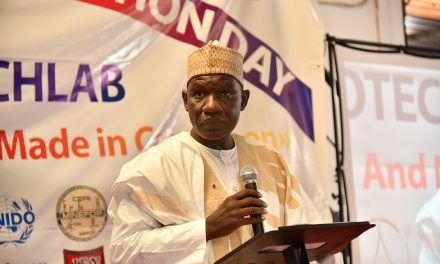Africa must boost the capacity of national data ecosystems in the implementation cycle of the sustainable development goals, embracing revolutionary changes in data collection, management, curation, analysis and use. So, although experts tend to agree that while data alone cannot change people’s lives, it is essential for the efficient delivery of services and allocation of resources in ways that would have the greatest impact.

Children share a digital tablet. Photo: Daniel Buah/Science Photo Library/via AFP
According to the United Nations (UN) Development Programme’s Africa Data Revolution Report 2018, African countries are making considerable efforts to strengthen the quality, accessibility and timeliness of data production and use – revitalising national statistical systems and open data policies and platforms in the process. At the same time, there had also been an increase in the collection and use of non-government generated data, especially among citizens and the private sector.
In recent years, African countries have emerged as champions of the data revolution, including data consensus that sets out a common position for measuring the UN’s Sustainable Development Goals (SDGs).
At the same time, African countries led by Kenya, Senegal and Ghana, have collaborated with the United States, Colombia, the UN, civil society and the private sector to set up the Global Partnership on Sustainable Development Data (GPSDD), the largest multi-stakeholder partnership that works with countries to bridge data gaps for sustainable development.
But there are ongoing challenges. According to Philip Thigo, a technology, data and public policy expert in Kenya, Africa is plagued by poor data infrastructure, poor information-sharing on the latest innovations and methods, as well as challenges in creating the right partnerships to share and use data in the ever-changing terrain of technology.
“Africa must leverage the power of partnerships and new models for action and cooperation for the public good, not for profit or individual gain,” Thigo insists. “We need a change of behaviour and attitude, including a culture change, especially at the level of policy and decision-making.
“The availability of data does not necessarily lead to evidence-based decision-making and action. We need fluency and data literacy for decision-makers, but also mechanisms to hold them to account when decisions are made that ignore data and evidence,” he said.
While appreciating that Africa has made progress in the past decade, Johannes Jütting, executive head of the Partnership in Statistics for Development in the 21st Century (PARIS21), told Africa in Fact that Africa needs user-driven data production, dissemination and communication, to align data with development agenda needs, transform data into specific user understandable information, and for messaging aimed at better decisions. Building data literacy among users was an essential component of this and would help mitigate misuse, as well as assist in upskilling those working with national data systems to produce more inclusive, high quality and timely data.
“Data has to be at the centre of policy and decision making,” Dr Anthony Mveyange, the executive director of Partnership for African Social and Governance Research (PASGR), told Africa in Fact. “Africa should build people’s capacity and a culture of using data for decision making, put systems in place to process data into information, and effect regulatory reforms to address legal challenges on how data is used, processed, harnessed, stored and accessed,” said Mveyange.
“But to make the data revolution sustainable, African countries must build the will of the people, ensure leadership and political buy-in, change culture, and invest in research and development,” he added.
In August 2014, the former UN Secretary-General, Ban Ki-moon, emphasised how vital the data revolution was to achieving the 2030 SDGs.
Underlining this point, Thigo said, “Improving the accuracy, timeliness, and availability of data will be critical to the success of the sustainable development agenda across every sector.”
“At the core of the data revolution is the need for a vibrant multi-stakeholder ecosystem that actively engages in closing data gaps, building the capacity of all data communities, including national statistical offices and other data producers and users in big data analytics, by leveraging existing capability, especially that of the private sector, to modernise data systems – seeking ways to engage the public and wider citizenry in using data to promote accountability and reduce policy bottlenecks,” Thigo said.
He added, “The data revolution is about multi-stakeholder collaboration, the realisation that no one sector works alone. It has also blurred the lines between data producers versus data consumers. Everyone has data to share and can leverage on other data communities.”
There is good reason to be optimistic. According to statistical expert Prof Ben Kiregyera, Africa, especially in the past 10 years, has embraced the data revolution, which has led to significant improvements in scope, quantity and quality, as well as to the use of statistics to support policy, planning and development processes.
“Africa is not only prepared to embrace the data revolution, it is already doing so,” Kiregyera said. “For instance, open data platforms are being built to increase data accessibility and usability, and the implementation of a major regional programme of civil registration and vital statistics, to ensure that no one is unaccounted for, is also well underway.”
Indeed, the wheels of the data revolution are turning in Africa. For example, at a National Forum on Harnessing the Data Revolution for Sustainable Development in 2015, Kenya committed to creating an inclusive data ecosystem – involving government, the private sector, academia, non-profit organisations, local communities and development partnerships – that tackles the informational aspects of development decision-making in a coordinated way.
Sierra Leone has rolled out an open and big data initiative for fiscal and economic data, partly funded by the World Bank. The government is working on a country-specific Sustainable Development Goal (SDG) data roadmap to achieve and monitor progress against the global goals.
Tanzania, meanwhile, is using a data-led advanced data planning tool (ADAPT), developed by PARIS21, to link global and regional indicators with national development indicators, to cost and plan data production activities, and to facilitate stakeholder engagement in data production and sharing.
Progress notwithstanding, experts agree that there is still a need to bridge data policy gaps across the continent, with current governance dispensations lacking the necessary imagination to transform continental ambitions to responsibly adopt and use data for development into reality.
“To bridge data policy gaps, there has to be a good understanding of the gaps [that exist] in different countries and collaboration between countries on the continent to share knowledge,” said Mveyange.
Jütting agrees, saying that bridging data gaps will require government support for user-driven and inclusive statistical data, and the will to implement a capacity strategy to fill these gaps and leave no one behind.
Governments must “support the digital transformation of national data and statistics systems to improve foundational data, including administrative data, make data understandable and ensure the interoperability of a data legal framework conducive to technological change and personal data protection,” he said.
[activecampaign form=1]
Raphael Obonyo is a public policy analyst. He’s served as a consultant with the UN Department of Economic and Social Affairs (UNDESA). An alumnus of Duke University, he has authored and co-authored numerous books, including Conversations about the Youth in Kenya (2015). He is a TEDx fellow and has won various awards.












